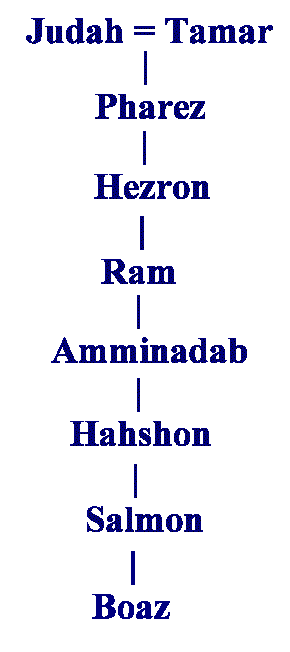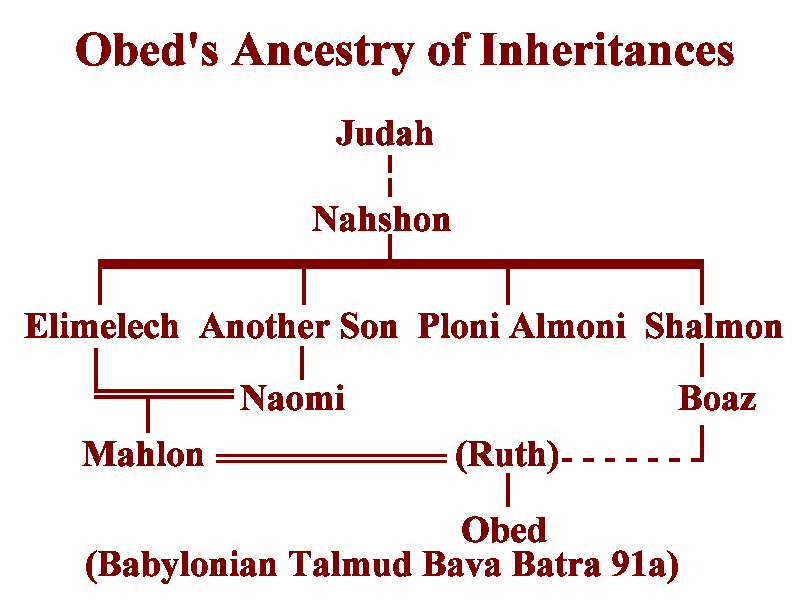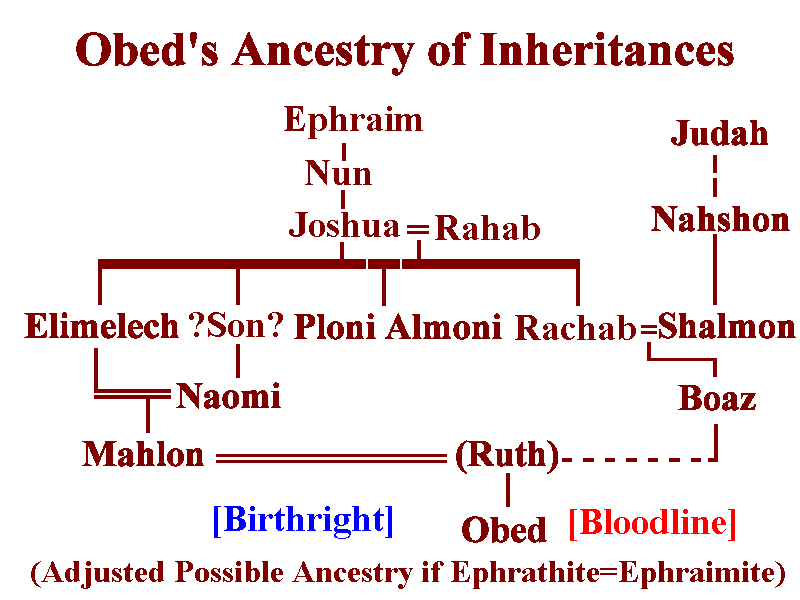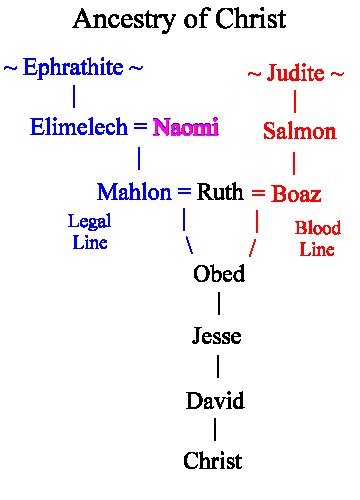14. Not in the Genealogies of Judah
A another contributing matter to be considered, despite what Rabbinical
tradition will suggest, is the simple fact that while there are numerous
families and their genealogies of Judah named in the scriptures, including
the one of David with Boaz included, there is not any mention of the
'birthright' ancestry of Elimelech, Mahlon, and Chilion from Judah in the
formal scriptural Jewish genealogies unless one properly considers I
Chronicals 5:1-2 as a clarification of the situation. Obed was 'raised up as
the seed of the dead', namely Mahlon and Boaz sacrificed a portion of his
wealth for the purchase of that which was Elimelech's, Mahlon's and Chilion's
to be the rights and properties of 'family inheritance' to be bestowed upon
Obed. Boaz was the  redeeming kinsman
of Elimelech and Mahlon who took it upon himself according to the
laws of God given by Moses to married Ruth and be the surogate father of
Ruth's firstborn son who was rightfully consider to be 'a son of Naomi', Naomi
being the last living member of the house of Elibelech and Mahlon. The
question to be investigated is, 'If Elimelech was a kinsman of Boaz as being
of the tribe of Judah, then where is Elimelech's Jewish ancestry? By God's law
Elimelech and Mahlon were the legal and rightful ancestors of Obed according
to 'birthright' and 'inheritacne'. All that was the family inheritances of
the house of Elimelech went to Obed, Ruth's firstborn son. That was the very
critical discused point of Ruth chapter 4 of what was being performed
accordng to Israel's law in respect to Ruth's marriage to raise up seed to
the dead.
redeeming kinsman
of Elimelech and Mahlon who took it upon himself according to the
laws of God given by Moses to married Ruth and be the surogate father of
Ruth's firstborn son who was rightfully consider to be 'a son of Naomi', Naomi
being the last living member of the house of Elibelech and Mahlon. The
question to be investigated is, 'If Elimelech was a kinsman of Boaz as being
of the tribe of Judah, then where is Elimelech's Jewish ancestry? By God's law
Elimelech and Mahlon were the legal and rightful ancestors of Obed according
to 'birthright' and 'inheritacne'. All that was the family inheritances of
the house of Elimelech went to Obed, Ruth's firstborn son. That was the very
critical discused point of Ruth chapter 4 of what was being performed
accordng to Israel's law in respect to Ruth's marriage to raise up seed to
the dead.
It is in the last 5 'tacted on' verses, 18-22, of the last and 4th chapter of
the book of Ruth that well establishes the 'bloodline' genealogy of Boaz the
'blood' ancestor of Obed. That genealogy is presented at the right. This
genealogy does two things. It uncharacteristicly presents a bloodline
genealogy in preference to a legal and rightful genealogy. Boaz had married
Ruth, as verses 5 and 10 of Ruth 4 stipulate, to raise up seed to the dead
Mahlon and to preserve that family's inheritence. Obed was legally of the
house of Elimelech and Mahlon. Why then is not the more 'rightful' genealogy
of the House of Mahlon presented rather than Boaz as the father of Obed?
Secondly, it also, very uncharacteristically, totally leaves out the
lawful, legal, and rightful genealogy of Obed in preference to the preferred
Jewish bloodline ancestry. In Matthew's Jewish aimed gospel, it was Matthew's
very intent to state Jesus' 'inheritance line ancestry', which gave to Jesus
the right of claim as the heir of King David. There according to Jewish
tradition and preference the legal and rightful ancestry which made of Jesus
the King of the Jews. Where does the Old Testament do the same for Obed? Only
if one considers 1 Chronicles 5:1-2 to be that declaration of Obed and thus
King David's 'birthright' being as of Joseph, does the Bible ever say
anything concerning Obed's 'birthright' ancestry from the house of Elimelech
and Mahlon. Certainly the Jewish 'editing and annotating' perspective is well
stated that, in that 'the genealogy is not to be reckoned after the birthright
for Judah prevailed above his brethren'—namely Joseph, Ephraim and/or
Israel.
Ya-but, one says, the ancestry of Mahlon and Elimelech is but the 'same'
genealogy of Judah as is Boaz, they being 'brothers'. This presumes that
in the strictist since the word 'brothers' literally means that Boaz, Ploni
Almoni, and Elimelech were actual sibling brothers. And this seems to be the basis for a
much later contrived Rabinnic 'Midrash' type of interpretation supported by
the Babylonian Talmud, Bava Batra 91a, which Bava Batra deals with such matters
as property laws, inheritences, and such related ancestrial lines. Of course
the 'Talmud' was not written and prepared until after the time of Christ and
can be shown in many instances to specifically tend to both discredit and
purposefully write Jesus Christ out from being the Messiah, which we know
him to be, and it does so from the very slanted Jewish biased perspective
upon the matter. This 'bias' as discussed later is not only exhibited in
the Rabinnical Talmud writings, but as later discussed, it can be seen in
conjunction with that actual 'presavation process' of the Torah, the prophets
and other such Old Testament writings. And it cannot be dismised that the
'added' last five verses of Ruth chapter 4 may well have been just such an
added Jewish editorial commentary favoring the 'Jewish' ancestory over the
herein considered Ephraimite ancestry of the house of David.
Now, while the initial seeming premise to the 'Rabbinic' interpretation to
the ancestry of Elimelech is based upon a very 'strict' application of the
word 'brother' to mean of being siblings of the same father and mother, even
the Rabbinic interpretation then take liberty with that 'strict'
interpretation by making of Boaz at best 'Nephew' and 'Cousin' rather than
an actual brother to Elimelech and Mahlon. Graphically the Talmud interpreted
ancestry is now presented and next stated. It states that the great and
courageous Jewish prince Nahshon had four sons including Elimelech, 'Ploni
Almoni', Shalmon (Salmon) who was the father of Boaz. and the fourth the
unnamed father of Naomi herself. This ties the whole matter of the legal and
rightful ancestry of 'inheritence' of not only Obed but king David and Jesus
Christ into a very 'neat' Jewish bundle. But we will point out that this
by its very nature is just 'too' neat to be true and there are gaping flaws
in this overly compack contrivance of the after Christ Rabbinic personal
interpretations from supposed 'oral traditions'.


It can be clearly seen from the above graphic on the left, that according to
the 'imagined' rabbinic interpretation, that Elimelech would have married his
neice Naomi, which is not entirely without presedence, as Abraham did the
same in marrying Sarai or Sarah, the daughter of his brother. And it is also
clearly shown, according to this contrivance, that Boaz is of the family of
Elimelech, which Ruth 2:1 so directly states but as his Nephew rather than
'brother' as is the similar case betwix Jacob and Laban (and in the scriptures
Laban does refer to his Nephew Jacob as 'brother'). But according to the
presented genealogy, Boaz is also of the family of Naomi, they being first
cousins, their fathers being brothers. This is but a little flaw though,
that it isn't stated that Boaz was of the family of Elimelech and Naomi, but
the scripture seems to imply that Naomi was not of that family and the
Rabinnic writing does stipulate otherwise.
In fact there is other matters of 'property' which would set into question
this Rabbinic interpretation. If Ploni Almoni, the nearer relative of right
to Elimelech were in fact Elimelech's brother, there should be no matter of
'purchase' within the consideration as right to the property of his brother
other than a redemption payment to take it out of debt but also Naomi would
not have the right to sell the property upon the death of Elimelech, as Ploni
Almoni as brother would possibly have such a right without a marriage to Ruth.
The Laws of Inheritance (Hilkhot Nahalot) set out that upon the deaths of
Mahlon and Chilion, the land would have reverted to Elimelech's brothers,
thus 'Ploni Almoni' would not have had to 'purchase' the land of Naomi nor
would he have had to marry Ruth to have claim upon the land. This throws
a wrench into the entire Rabbinnic writing of Bava Batra 91a in setting
out that Elimelech, Ploni Almoni (Tov as such gives his name there) or such a
one. And if Salmon, father of Boaz, were so closely related as being brothers,
the sons of Nahshon, Boaz might also claim such right via his father's claim.
But is Ruth did marry and have a son raised to the dead house of Elimelech
then the 'brothers' would loose their claim and thus perhaps the real
problem at hand, as the inheritance would fall to such as Obed being a legal
'descendant son' other than into the hands of 'uncle/brother' or
'cousin/nephew'. As Obed was heir to the lands of Elimelech, Mahlon and
Chilion, it would be those lands upon which David grew up on, the Ramah hills
of Ephraim.
The graphic at the right above presumes some traditional considerations as
well. One tradition has Rahab, the innkeeper of Jericho, becoming the wife
or 'a wife' of Joshua and having some daughters who become ancesters to
various prominant prophets and such. It is of some question whether Rahab of
the Joshua and Jericho era would be of the same age as the father of Boaz and
of a young enough age to baer Boaz as a son? But her daughter of Joshua might and that could
be the maternal link between the family of Elimelech and Boaz, similar to how
Rebecca was the maternal link between Jacob and Laban who were called in the
Bible 'brothers'. And if so it brings further meaning and insight to that
scripture of history in 1 Chronicles which clearly attempts to distinguish
the why of the genealogy being kept per Judah's bloodline 'though' the
'birthright' blessings to the ancestry of the Messiah were Joseph's.
Now, 'Such a one', named Ploni Almoni by the Hebrew Bible or 'Tov' by traditional
stories, would be the 'nearer kinsman' being brother rather than nephew as
Boaz is made out to be. And as the brother of Elimelech, he would have a
claim to the land directly as being Elimelech's brother. It would have
reverted to him by right. Likewise, if Solmon was the brother of Elimelech,
he would have by law and right the same such claim, but not if he were
but 'in-lawed' out of any such claim. But Boaz, being Nephew by maternal
marriage with his mother being a sister to Elimelech, he would have a
more distant claim, being the son of Rachab, likely daughter of Joshua by
Rahab. Thus what this logic sets out is that the term 'brother' in Ruth in
reference to Boaz and Ploni Almoni, is that neither of them were actual
sibling blood brothers but more generically, 'brothers' in
the same since that Jacob and Laban where 'brothers'. And this seems to be
the more correct Old Testament interpretation of 'brothers' and 'sisters'
being 'related' but not necessarily of the most strictly defined immediate
family of father, mother, brother, and sister. This is further discussed in
the topic of what it means to be a 'brother' or 'sister' in the Old Testament.
And it must therefore be concluded that the later more 'strict' interpretation
of the Levitical Law of Marriage just applying to immediate sibling brothers
is of latter Jewish interpretation and not what was had in the Old Testament
Law.
This brings us to the actual proposed ancestry of Obed and thus Christ, being
 outside of Judah by legal right of law through Elimelech the Ephrathite or
Ephraimite. This ancestry is graphically set out to the right. Thus there
is no known connection between Ploni Almoni, Boaz and Elimelech except that
they where all part of Elimelech's extended family and not the Jewish
proposed family of the Talmud of Nahshon for the reasons set out immediately
here and also for all those set out throughout this presentation. The most
likely conclusion must be such a family relationship as was between Mary
and Elisabeth and John the Baptist and Jesus Christ. They where 'cousins'
but not through a strict fatherly or paternal relationship. Their family
relationship would have had to have been maternal as Jesus was of the house
of David and John the Baptist was a Levite. So such is considered to
be the family relationship of Elimelech and Boaz. Boaz was a Judite of
Jewish descent and Elimelech was an Ephrathite of Ephraimite descent, and
yet they were 'brothers' in the same since that Jacob and Laban were
brothers and that Abraham and Sarah where brother and sister.
outside of Judah by legal right of law through Elimelech the Ephrathite or
Ephraimite. This ancestry is graphically set out to the right. Thus there
is no known connection between Ploni Almoni, Boaz and Elimelech except that
they where all part of Elimelech's extended family and not the Jewish
proposed family of the Talmud of Nahshon for the reasons set out immediately
here and also for all those set out throughout this presentation. The most
likely conclusion must be such a family relationship as was between Mary
and Elisabeth and John the Baptist and Jesus Christ. They where 'cousins'
but not through a strict fatherly or paternal relationship. Their family
relationship would have had to have been maternal as Jesus was of the house
of David and John the Baptist was a Levite. So such is considered to
be the family relationship of Elimelech and Boaz. Boaz was a Judite of
Jewish descent and Elimelech was an Ephrathite of Ephraimite descent, and
yet they were 'brothers' in the same since that Jacob and Laban were
brothers and that Abraham and Sarah where brother and sister.
Now the Biblical genealogies of Judah are vastly more set out than those of
Ephraim. In 1 Chronicles 2-3 is where a goodly share of the genealogies of
Judah are presented as the bulk of those two chapters. In fact the
ancestry of Hur is noted as the 'firstborn' and father of Bethlehem in
1 Chronicles 5:4. This is not Nahshon's line at all. And if Elimelech was
of the house of Judah, one might consider that he could have been of that
line. But he was not. He was an Ephrathite and never mentioned in any of
the Biblical genealogies of the families of Judah.
Now the New Testament genealogies of Jesus present somewhat of an enigma of
there own without bring in the consideration of Joseph of Egypt. There are
two diferring genealogies set out by Matthew and Luke. In short one seems
to be parent oriented through bloodline father to son (Luke) and the other is
by which right the claim to the Jewish throne did come (Matthew). At least
that is one consideration. Another consideration is that one represents
Joseph's ancestry and the other Mary's. Joseph and Mary were near cousins
and their ancestry should not so differ along the vast range of ancestry. So
that is easily dismissed. Mary was mother of Jesus by birth and Joseph the
carpenter was father by the claim of legal adoption as Joseph presented
himself to be the father of Jesus and taught him his trade.
What can most assuredly be pointed out about the New Testament genealogies of
Matthew and Luke is that they both have the intent to show that Jesus was the
legal and rightful 'Son of David'. And since the book of Ruth had already
set out and emphasised that David, Jesse, and Obed where born through the
line of Boaz and Ruth, it is most understandable that this was the only well
preserved ancestral line that could have possibly been set out through Boaz
the Jew. The details of the ancestry of the legal and lawful by right
ancestry of Christ through Elimelech had long been surpressed and lost in
the records of the Jews. And only the Rabbinnic Talmud after the time of
Christ did attempt to resurrect it by forcing it to be a matter of all those
related being of the house of Nahshon the Jew, which we have already just
discused and refuted as being likely.
So what is left? Perhaps we will have to wait until Christ so declares his
genealogy Himself. Or perhaps when the plates of brass are allowed to be
brought forth, they will present the true legal line of Christ through
the ancestry of Mahlon and Elimelech as to the right to the priesthood, the
blessings of the fathers and the covenant blessings of Abraham preserved in
the house of Joseph (D&C 27:10) and thence through Ephraim. Remember, far
removed Lehi with the aid of that record was able to trace his ancestry back
to being of the lineage of Joseph through his son Manasseh. Thus one is left
to wonder if such a record of Elimelech who was much clsoer in time to Joseph
and of what might be considered of greater significance than Lehi, might also
so be able to be connected to the fatherhood of Joseph of Egypt. Lehi does
state that that record did contain the genealogies of Joseph, and through the
preserving hands of the Jews and their perspective, the Bible certainly is
way short on any such genealogies of the house of Joseph. And most assuredly,
such has been clearly written out of the records which have been maintained
by the Jews which we have as the Bible today.